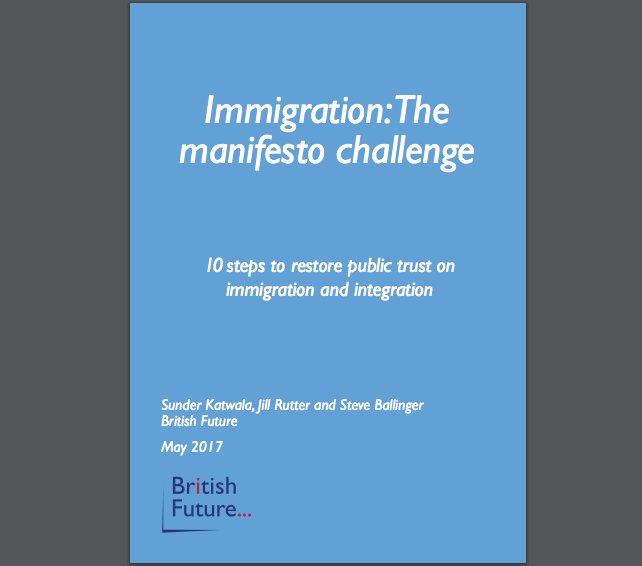Report says election campaign needs to focus on future choices Britain should make on immigration after Brexit
With Brexit likely meaning the next government will oversee the most significant overhaul in a generation of the framework for immigration to Britain, the think-tank British Future last week published its 'manifesto challenge' for parties and candidates ahead of the general election.
 The 29-page report, which you can read here, sets out 10 steps that British Future says can help restore public trust on immigration and integration.
The 29-page report, which you can read here, sets out 10 steps that British Future says can help restore public trust on immigration and integration.
British Future says that the challenge to the political parties in the 2017 election campaign is to go beyond the debate in previous campaigns, which often focused on whether we can talk about immigration and how we talk about it, and instead "engage constructively in a new debate about the future choices that Britain should make on immigration after Brexit."
"How much immigration do we want to keep? How can a new immigration system rebuild public confidence and consent? And how can it ensure that we meet the needs of our economy and our public services, while upholding our international obligations?" the report asks.
Part II of the report sets out in detail British Future's own proposals for a 'common ground' approach to immigration, one that aims to secure majority public support and consent.
The ten proposals are:
• Invest properly in an immigration system that is effective, fair and humane;
• Propose a new UK migration deal with the EU to replace free movement;
• Hold Britain's first ever Comprehensive Immigration Review; and set sensible limits for immigration controls, making promises that governments are in a position to meet;
• Review the rules on family migration for non-EU immigration;
• Use money generated by the Immigration Skills Charge on training for UK workers; and consider measures to reduce dependence on migrant workers;
• Uphold refugee protection, improve the system and extend community sponsorship;
• Set a target for increased student migration – so that Global Britain competes to top the global league in attracting international students;
• Implement local impacts funding, to ensure net gains from migration reach the places of most change;
• Increase political accountability on immigration through a Migration Day report to Parliament and the public;
• Commit to introducing a national integration strategy.
While acknowledging that immigration has been a "highly polarising issue" in British politics, British Future believes finding consensus among the majority is an achievable aim for the immigration debate.
"It would be defeatist in the extreme to write-off such an important issue as uniquely and inherently polarising. Yet it can sometimes feel that politicians do just that when they try to avoid talking about immigration or change the subject when it is raised," the report states.
The report concludes that the challenge for politicians is now one of rebuilding public trust after years of unheard concerns and broken promises across Conservative, Coalition and Labour governments.